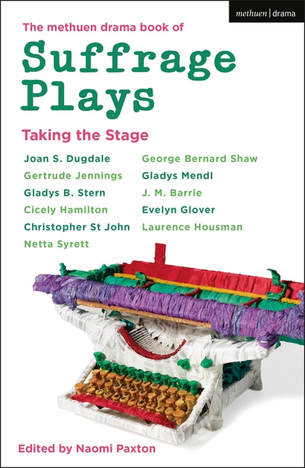|
My second edited collection with Methuen Drama is being published on the 2nd July! It contains twelve pieces in all - a wide variety of material written by female and male suffragist writers between 1908-1914. Spanning different styles and genres, the pieces explore many issues that interested feminist and suffragist campaigners such as the value of women's work, domestic and economic inequality, visibility in public space, direct action and its consequences, sexual double standards, and the influence of the media on public opinion. This collection builds on my first volume of plays, published in 2013. If you get both you will have an impressive collection of playable, accessible and fascinating plays that speak to us directly about how the suffrage movement represented itself on the stage and through the medium of performance. Here's a little bit about each of the plays to whet your appetites! The wrapped typewriter on the cover is by the artist Alinah Azadeh, and was originally created for an exhibition in Parliament in 2015. You can read more about it here. I wanted to use it on the cover because it has the colours of the three most prominent suffrage societies - the purple, green and white of the Women's Social and Political Union; the green and gold of the Women's Freedom League, and the red, white and green of the National Union of Women's Suffrage Societies. The colours of the Actresses' Franchise League were pink and green, hence their use for the text on the cover. So - to the contents! First performed at the Theatre Royal Haymarket in 1909, Might is Right by Netta Syrett is all about a group of women from the Secret Society for Women's Suffrage who kidnap the Prime Minister and refuse to release him until he agrees to give women the vote. The final speech from Cicely Hamilton's A Pageant of Great Women, published in the Women's Freedom League newspaper The Vote in 1909 and here titled Free Woman to Free Man is a passionate call for women's equality and it's one of my favourite pieces to perform. A Woman's Influence by Gertrude Jennings, also from 1909, is about a group of women concerned about working conditions for female factory workers who try to get the attention of their local MP. It was one of the most popular plays at the WSPU Women's Exhibition of 1909, and reviewed in their paper Votes for Women as 'deep-sighted and wise'. The fun and fast paced Press Cuttings by George Bernard Shaw mocks class, privilege, politicians, patriotism, sexual double standards, militants, and anti-suffragists! It was performed regularly by the Actresses' Franchise League. A poem from 1910 that I've been singing with Winifred the suffrage ukulele at lots of events this year - Woman This and Woman That by Laurence Housman. Housman was an Honorary Male Associate of the Women Writers' Suffrage League and co-founded the Suffrage Atelier. The Twelve Pound Look by J.M. Barrie is a moving short play about the value of women's work and independence, and questions ideas of success and ambition as well as equality of opportunity. It was first produced in 1910 at the Duke of York's Theatre, London. A short heartfelt piece, G.B. Stern's For One Night Only is set backstage in a touring pantomime company, and hints at the realities of life for young actresses on the road. It was produced in 1911, two years after Stern finished her acting training at RADA. With allusions to two of the most famous suffragettes, Emily Wilding Davison and Constance Lytton, the life and death of a militant woman is the focus of Her Will by Christopher St John. The piece was performed in the NUWSS section of an exhibition in 1914. A slice of Edwardian London street life through a suffrage newspaper seller's eyes, Su' L'Pave by Gladys Mendl is a funny, pointed and carefully constructed piece of suffrage propaganda. Published in 1914 in Votes for Women, by then the paper of the United Suffragists, it's lively, evocative, and a great piece for ensemble work and devising! I featured an extract from Which by Evelyn Glover in the Women and War: The West End and the Western Front Living Literature walk for the 2017 Being Human Festival, It's about a young nurse torn between her father's wishes, and the prospect of a new job overseas In 10 Clowning Street by Joan Dudgale an anti-suffragist Prime Minister's publicity stunt backfires spectacularly! First performed for the militant Men's Political Union for Women's Enfranchisement in 1913, the play is cynical about the motives of politicians and the media. The book closes with my adaptation of Cicely Hamilton's Anti-Suffrage Waxworks, as reviews but no scripts of the original survive. It's a playful, satirical, and versatile suffrage themed version of the late 19C/early 20C entertainment Mrs Jarley's Waxworks In total, this is a collection of interesting, thoughtful and playable pieces in many different styles that are not only a fantastic resource for performance but also a springboard for further research, study, and practical devising work. Find out how to order it here!
0 Comments
Leave a Reply. |
NaomiThoughts, reflections, bits of research Archives
April 2023
Categories
All
|

 RSS Feed
RSS Feed